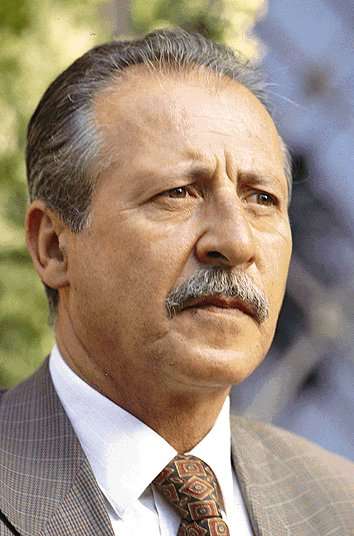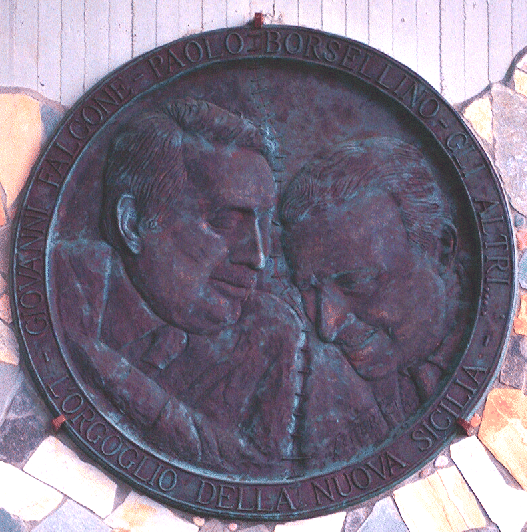<Back to Index>
- Philosopher Auguste Comte, 1798
- Poet Edgar Allan Poe, 1809
- Magistrate Paolo Borsellino, 1940
PAGE SPONSOR

Paolo Borsellino (January 19, 1940 – July 19, 1992) was an Italian anti-Mafia magistrate who was killed by a Mafia car bomb in Palermo, less than two months after his fellow anti-Mafia magistrate Giovanni Falcone had been assassinated.
Born in a middle class Palermo neighbourhood, la Kalsa, Borsellino obtained a degree in law at the University of Palermo, with honors, in 1962. While a university student he was member of the Fronte Universitario d'Azione Nazionale (FUAN), a right wing university organization affiliated with the Movimento Sociale Italiano. After his father's death, he passed the judiciary exam in 1963. During those years, he worked in many cities in Sicily (Enna in 1965, Mazara del Vallo in 1967, Monreale in 1969). After he married in 1968, he transferred to his native Palermo in 1975 together with Rocco Chinnici, where he then started his unfinished work to fight and defeat the growing Sicilian Mafia.
His accomplishments included the arrest of six organization members in 1980; in the same year, one of his workmates, the Carabinieri captain Emanuele Basile, was murdered by the Mafia. Because of that event, he was assigned police protection. During those years, working together with Magistrates Giovanni Falcone and Rocco Chinnici,
Borsellino continued his research about the Mafia and its links to
political and economical powers in Sicily and Italy. He became part of
Palermo's Antimafia Pool,
created by Chinnici. The Antimafia pool was a group of investigating
magistrates who closely worked together sharing information to diffuse
responsibility and to prevent one person from becoming the sole
institutional memory and solitary target. The group consisted of
Falcone, Borsellino, Giuseppe Di Lello and Leonardo Guarnotta. In 1983, Rocco Chinnici was killed by a bomb in his car. His place in the Antimafia Pool was taken by Antonino Caponnetto. In 1986, Borsellino became head of the Procure of Marsala, continuing there his personal campaign against the Mafia bosses, in the most populated city of the province of Trapani.
His links with Giovanni Falcone, who remained in Palermo, allowed him
to cover the entire Western Sicily for investigations. In 1987, after
Caponnetto resigned due to illness, Borsellino was a protagonist of a
great protest about the unsuccessful nomination of his friend Giovanni
Falcone as head of the Antimafia Pool. In
1992, Borsellino was killed by a car bomb in Via D'Amelio, Palermo,
less than two months after the death of his good friend Falcone. The
bomb attack also claimed the lives of five policemen: Agostino
Catalano, Walter Cosina, Emanuela Loi, Vincenzo Li Muli, Claudio
Traina. In recognition of their efforts in the anti-Mafia trials, he and Giovanni Falcone were named as heroes of the last 60 years in the November 13, 2006 issue of Time Magazine. In
his last video interview, given on May 21, 1992 to Jean Pierre Moscardo
and Fabrizio Calvi, Borsellino spoke about the possible link between
Cosa Nostra's mafiosi and rich Italian businessmen such as future Prime
Minister Silvio Berlusconi. The
interview received surprisingly little coverage on Italian television
(half of which was owned by Berlusconi); as of 2007, it has been aired
on only one occasion, and that by a satellite channel RaiNews 24 in 2000, in an abridged version which is a mere 30 minutes long (it is 50 minutes long in its original form). Salvatore Riina, the head of the Corleonesi Mafia
Family, is now serving a life sentence in prison for sanctioning the
murders of Borsellino and Falcone, as well as for many other crimes. Borsellino
today is considered as one of the most important magistrates killed by
the Sicilian Mafia during the 1980s and 1990s, and he is remembered as
one of the main symbols of the battle of the State against the Mafia.
Many schools and public buildings were named after him, including the Palermo International Airport (now known as Falcone-Borsellino Airport). A memorial by local sculptor Tommaso Geraci is there. His sister Rita ran as centre-left presidential candidate in the 2006 regional election, after having won the regional primary election, but lost to incumbent Salvatore Cuffaro.
